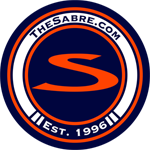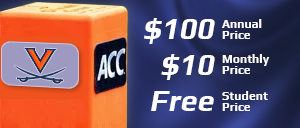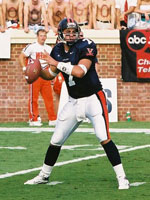 |
|
Matt Schaub broke just about every passing record at the University of Virginia. |
Matt Schaub is one of the greatest quarterbacks ever to play for the University of Virginia. He holds nearly every passing record at UVa, including completion percentage for a single season and career as well as number of attempts, completions and passing yardage for a single game, season and career. He also holds the record for number of games passing for 200 yards or more for a season and career as well as number of touchdowns for a career (56) and season (28). After breaking just about every UVa passing record in 2002, Schaub won Player of the Year and Offensive Player of the Year honors in the ACC.
A potential rising star when playing back-up to Michael Vick in Atlanta his first three seasons, Schaub battled with injuries his first two seasons in Houston before stepping it up as one of the premier quarterbacks in the National Football League in 2009. This season, Schaub finally played a full season without a major injury and the result was a 9-7 record for Houston, its first winning season in franchise history. Schaub led all NFL quarterbacks with 4,770 yards passing, which is the sixth best in NFL history.
The future is bright for Schaub, who was recently given a $10 million bonus and contract extension for his efforts. Not long after this interview, Schaub was invited to play, and start, for the AFC in the 2010 Pro Bowl. Matt shined while producing touchdown drives on the three series he started. He was in for one more series at the end, but that was only to take the ‘kneel down’ from the victory formation. For his efforts, he was named the Pro Bowl MVP.
TheSabre.com caught up with Matt to discuss a range of topics including his time in the NFL as well as at UVa, Virginia’s recent coaching situation, and a few other odds and ends. Enjoy!
The Interview
 Mike: How refreshing was it to finally stay healthy throughout an entire season and have a chance to make the playoffs?
Mike: How refreshing was it to finally stay healthy throughout an entire season and have a chance to make the playoffs?
SCHAUB: Yeah, it was good this year. I was able to stay on the field. I had a few nicks here and there and some setbacks but was able to play through it. My guys did a great job up front protecting me and keeping me well. Although with our record we got to 9-7, the best record in franchise history, we didn’t reach our goal, which was to get to the playoffs and get a chance at the Super Bowl. We made some strides and we progressed well – things are only going to get better from here.
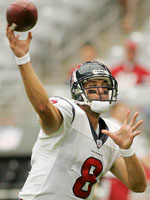 |
|
Schaub has blossomed with the Houston Texans, becoming one of the best quarterbacks in the NFL. |
 Mike: What areas have to improve for Houston to make the playoffs next season? The competition in the AFC and your division doesn’t look to be taking a step back next year.
Mike: What areas have to improve for Houston to make the playoffs next season? The competition in the AFC and your division doesn’t look to be taking a step back next year.
SCHAUB: Just look at the playoff picture this season and what it came down to. In the last week of the season there were six teams vying for the Wild Card spot because it was such a tight race. We were fortunate, after our start in December at 5-7, fighting back to win our last four and put ourselves in a position to get in if we had some help the last week.
Obviously that’s not how we drew up our season. We wanted to play our way in and get in the hunt. We were hoping for some help and it didn’t happen. As a team we took a lot of positives from the fact that we faced a lot of adversity, a lot of close games. There was really only one game this season, first week of the year against the Jets, where we really weren’t in the ball game in the second half. Every other game we were either leading or right within a score and it just didn’t happen for us.
I think for our team to get to the next level and that next step is to realize it’s all right there in front of us. We just need to be able to make those two or three plays that make you win games. This season there were a couple of times we made the plays that allow you to lose it. We just need to find a way to turn those in our favor and we’ll be right there in January.
 Mike: So it’s a matter of execution in your eyes and not about personnel, perhaps bringing in a player or two to improve certain areas?
Mike: So it’s a matter of execution in your eyes and not about personnel, perhaps bringing in a player or two to improve certain areas?
SCHAUB: Absolutely. The answer isn’t the players – it’s not that we need a player or something. We have the right guys, the right pieces to the puzzle. What we need to do is just execute and take advantage of opportunities that we have early in the season and in the middle of the season to set ourselves up in the end where we’re taking care of our own business and getting in.
You know, every year in the NFL there’s going to be turnover, there are going to be some changes I guess with whatever contract situations there are presented in the offseason with free agent or restricted free agents, and the Draft and all of those things. Those are the areas that you address [as a team]. Really, you look at our team and what we had this past year; we’ve had some injuries to key players in key positions and we’ve fought through those things and had guys step up. We have the right pieces, we have the right guys, we have the right make-up in our locker room to accomplish what we want to accomplish. It’s a matter of going out and taking care of our business on the field and not leaving those games out there.
 Mike: What about the kicking situation? This area quite obviously hurt Houston’s chances to win an extra game and make the playoffs.
Mike: What about the kicking situation? This area quite obviously hurt Houston’s chances to win an extra game and make the playoffs.
SCHAUB: Everyone has their days. Kris [Brown] had a rough year and he’d be the first to admit that. We all have our moments. But when the kicker has those moments, he doesn’t have that many opportunities to go back out there like other position players do. There were plenty of games where it really didn’t need to come down to a field goal or last second thing. We, as an offense and defensive unit, could have prevented a lot of those situations had we executed or done our jobs earlier in the game.
I think this is something that Kris will work through. He’s a veteran and has been around the League now for 11 or 12 years, so he’ll rebound – no question about it. He’ll be better for going through some rough times. People forget, especially around the city of Houston, of how good he’s been for the duration of his career being one of the original Texans. Since I’ve been here, and the two years prior, he won about four or five games for us. He’ll rebound and be better than ever, I believe. Good kickers are so hard to come by in this league and replacing a guy that’s been doing it for over a decade isn’t the answer. He’s going to get better and he’s going to be fine.
 Mike: Which types of defenses are the hardest to prepare for/play against?
Mike: Which types of defenses are the hardest to prepare for/play against?
SCHAUB: With the league right now, there’s a transition where there are a lot of teams that have already been in a 3-4 or going to a 3-4. It used to be where there was only a handful, whether it was three or four teams – now’s it’s close to 10 or 11 going to the 3-4 defense. It’s not complicated [as a whole]. It’s those teams, that on third down do those types of things [to make it difficult] – you watch the New York Jets, you watch the New England Patriots, you watch the Steelers, who do it from time to time – when you get into third down passing situations, they go into a nickel defense, or even a dime, and you have one defensive tackle in the game with his hand on the ground and everyone else is just walking around, standing up. It’s those teams that do stuff like that where it’s hard to identify who is going to be blitzing, and where they’re coming from, and get your protections right. Ultimately, teams like that bring only four guys and keep seven in coverage, but it’s just identifying where they’re coming from. It takes a lot of preparation during the week to figure out how you’re going to protect and how you’re going to attack those types of defenses.
 Mike: Talk about various reads and progressions relating to being a QB at the NFL level as well as in college. How many decisions do you make before the snap of the ball and during the play?
Mike: Talk about various reads and progressions relating to being a QB at the NFL level as well as in college. How many decisions do you make before the snap of the ball and during the play?
SCHAUB: For me personally, once I break the huddle, once I get the play called, my head is already spinning with what my read is, what am I looking for, what down is it, what coverages am I going to face, what does the defense like to do in this situation, what their blitz is. Those are all of the things that are circling in my head once I have the play called. It all takes place from the time we break the huddle until the ball is snapped. I have a pre-snap queue once I break the huddle. Then I come to the line and recognize what the defense is running and what coverage they’re in, if there’s a blitz or not a blitz, and who I can eliminate in my route based on the coverage – my coverage key [tells me] where I’m going to throw the ball. Once the ball is snapped, it’s just going through my progression whether it’s one, two, three and run or one, two and [pass] to my check down. A lot of the pre-snap stuff is the more important thing – what is the defense doing while I’m under center and trying to diagnose that information so that I can make a good decision.
 Mike: The media was once invited to an Al Groh/Bill Musgrave seminar at the McCue Center and they focused heavily on teaching us some of what a QB has to go through in terms of his progressions and time. It was said that in the NFL, it’s not often that a QB gets to his third option in the progression and in college it’s not often that the QB can get to his second, unless it’s a check down play. Is that about right?
Mike: The media was once invited to an Al Groh/Bill Musgrave seminar at the McCue Center and they focused heavily on teaching us some of what a QB has to go through in terms of his progressions and time. It was said that in the NFL, it’s not often that a QB gets to his third option in the progression and in college it’s not often that the QB can get to his second, unless it’s a check down play. Is that about right?
SCHAUB: I would agree with that. In college you, you might get to two some of the time. But when you call a play, you pretty much know where it’s going to go and you make that throw regardless. You might get to two, but very rarely do you get past that. In the NFL, you rarely ever have time to get past number two, and if you do you’re probably throwing to your check down as your three, and that’s as you’re falling to the ground or getting hit. You very rarely get any further unless it’s a three man rush and you’re able to move around inside the pocket and buy some time and look down field and hit an auxiliary receiver.
 Mike: So when we’re watching NFL games and we see the quarterback’s head on a swivel, how much of that is progressions and how much of it is just a deliberate look off to fool defenders?
Mike: So when we’re watching NFL games and we see the quarterback’s head on a swivel, how much of that is progressions and how much of it is just a deliberate look off to fool defenders?
SCHAUB: There are some teams out there where there really aren’t progression reads – they kind of let guys freelance and do their own thing. From things I’ve heard, Dallas might be one of those teams – they kind of let Tony [Romo] do his own thing. Ben [Roethlisberger] is one of those guys that likes to pump fake and do a lot to try and move defenders to create openings. A lot of what Ben does is taught, and we do it a little bit [at Houston]. A lot of defenders, especially in zone defenses, read the quarterback’s eyes. If as a quarterback you can get them to think you’re going one way and you just look them off, they go running and there’s an open hole in the backside. That’s what a lot of guys are doing because defenders are getting smarter and keying on the quarterback’s eyes.
 Mike: Who are the toughest corners to throw against in a man-to-man situation?
Mike: Who are the toughest corners to throw against in a man-to-man situation?
SCHAUB: One of the best who is really coming up in this league is Darrelle Revis for the Jets. He’s been playing the past two years as a top-notch corner. A guy that’s been doing it for a number of years is Nnamdi Asomugha over in Oakland. He’s a lock-down guy. There are very few times when he’s lined up in a man-to-man situation where he’ll get the ball thrown his way much. That’s why you don’t see him with a lot of stats and interceptions because teams just don’t try to go at him. Those two guys, at least in the AFC, are two of the better coverage corners.
 Mike: Talk about the time commitment for you as a quarterback in the NFL. What’s your schedule like and how much time do you have in the offseason?
Mike: Talk about the time commitment for you as a quarterback in the NFL. What’s your schedule like and how much time do you have in the offseason?
SCHAUB: In the offseason, I probably have more time than people think. During the season I’m in there every day. Tuesday is our quote-unquote ‘off day’, but there’s never an off day until the end of the season, for me anyway.
I go in on Monday and Tuesday and get any necessary treatment, workouts in, and then watch film. I’m not in there quite as much on those days as I am the other days as we’re trying to get fresh from the game we played on Sunday and then get a preview for our next game. It’s hard to study the film until you get the game plan in hand. You watch players and how the defenses play throughout the course of a game. Then once Wednesday comes we get the game plan. I usually get to the stadium about 5:15 in the morning and start doing some stuff in the training room and watching film for our 8 o’clock meeting. Our day goes from about 8 o’clock in the morning until about three or 3:30 in the afternoon. I probably get home about five or 5:30 on Wednesdays and Thursdays. On Friday we go in about the same time. There are no formal meetings after practice, so we’re done probably around 1 o’clock. Saturday is just a walk through and we travel and go to the hotel [if the game is away]. Then go cut it loose on Sunday.
That’s a brief summary of the time commitment during the season – during a game week. In the offseason you take a little bit of time to relax and rejuvenate and kind of refresh yourself because it’s such a long marathon of a year – you just try to kick back and recover, relax and breathe a little bit, travel and maybe see the family and try to be a regular person and re-integrate yourself into society [laughs]. That’s kind of what the offseason is about. Then once you get that time to catch your breath a little bit, then you get back in the gym and work out and get ready for the offseason program.
For this offseason in particular I’ve got big plans because my wife and I are expecting a little girl in March, so we’re busy getting ready for her to come along.
 |
|
Schaub along with parents Dale and Debbie during Senior Day in 2003. |
 Mike: Is it as much fun playing as a pro as you had hoped for? I know it’s a unique experience playing college football and enjoying that time, but what’s it like as a professional when it’s your occupation?
Mike: Is it as much fun playing as a pro as you had hoped for? I know it’s a unique experience playing college football and enjoying that time, but what’s it like as a professional when it’s your occupation?
SCHAUB: I can’t even begin to describe how much fun it is to play the game of football at this level. It’s something that as a little kid you watch it on TV and you always dream of playing in the NFL and being on TV every Sunday. To actually be living it? You try to take a step back every once in a while to not take things for granted and realize how privileged you are and what an honor it is to play this game. Very few people get to do it, and I think there are guys that take it for granted and don’t understand what they have while they have it. Then once it’s gone they have a tough time coping with it.
Like you said, it is a unique experience to play college football. When you go in with a bunch of guys in your own dorm and you’re away from home and on your own, all you have are the buddies that you’re playing ball with. You’re going through the same life situations together – you’re going to class together, you’re living together, you’re practicing together – you’re basically doing everything together. It’s something special when you play college football. It’s a big difference once you get to the NFL because you’re going into a situation where you’re living on your own and you don’t have classes to go to – you leave the facility and guys go to their families. It’s just a different dynamic.
We have a very close-knit group of guys and we have something special going on here in Houston – there are very few egos and very few groups within the group. I think that’s something that separates some of the teams that have a chance from some of the teams that don’t necessarily have as much of a chance to be successful. Talent can take you only so far, so you have to have that extra something. If you don’t have it, it’s going to be an uphill battle.
 Mike: Talk about your time in Atlanta. Did that help you to develop or was it wasted time?
Mike: Talk about your time in Atlanta. Did that help you to develop or was it wasted time?
SCHAUB: It definitely helped me develop. I get asked the question a lot because I’m one of the guys that sat and waited his turn for a couple of years rather than one of those guys that came into the league and got thrust into a situation. I always get asked which way is better or which way would you have rather had. I think my situation was great because I came into the league and was behind possibly the most visible athlete in the world next to Tiger Woods at that time. That really helped me prepare, and watch, and learn and develop my ideals and thinking about how I was going to handle playing the position when I got an opportunity – because I was watching Mike go through media, game plans, practice and meetings. I thought it was a great opportunity for me to learn from him and to grow as a player. Not to mention I came into a system that was very similar to what I ran in college, so the learning curve X’s and O’s wise was cut down dramatically for me.
 Mike: What (or who) has made the greatest impact on your development as a pro QB?
Mike: What (or who) has made the greatest impact on your development as a pro QB?
SCHAUB: Just talking about coaches in general helping me along the way, I’d probably have to say it goes back to my college days with Coach Groh and Bill Musgrave. They were the ones that really helped me to become the quarterback I developed into. When you go to college just out of high school you don’t really know the game necessarily that well or to the level you’re supposed to know it. They’re the ones that really taught me how to play the position both on and off the field. Once I got into the league, a lot of what they taught me is what I used in Atlanta – and coming to Houston and taking the next step in my career working with Coach Kubiak – with him and all of the great quarterbacks he’s been around, great offenses – he’s the one that really helped me take my game to another level and help me to become a much better quarterback.
 Mike: You just picked up a $10 million bonus and contract extension? What did you buy?
Mike: You just picked up a $10 million bonus and contract extension? What did you buy?
SCHAUB: Well, I haven’t gotten any of that money yet (laughs). My wife and I got a new home, so we’re going to be moving in about a month. We’re getting ready for a little girl so I bought a stroller and a crib and all of this other fun stuff for a little girl.
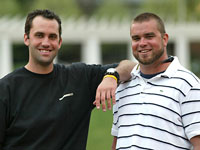 |
|
Matt Schaub and best friend Zac Yarbrough take in a UVa spring football game in 2005, Matt’s last time in Charlottesville. |
 Mike: Has the VAF or your buddies at SportsPage hit you up yet?
Mike: Has the VAF or your buddies at SportsPage hit you up yet?
SCHAUB: Well, my buddies at SportsPage are constantly hitting me up and I’ve made my contribution. I’m waiting to see some return on investment at this point. The guys at the VAF – Joe Hall was just in town yesterday, but unfortunately I was unable to meet up with him. Yeah, all of these ‘434’ numbers are starting to call again.
 Mike: Right now you’re so important to everybody, even to TheSabre.com. Everybody wants a piece of you, Matt.
Mike: Right now you’re so important to everybody, even to TheSabre.com. Everybody wants a piece of you, Matt.
SCHAUB: I was wondering, because with TheSabre.com it’s taken five or six years to re-connect. I was beginning to wonder if the Virginia world had forgotten about me.
 Mike: What’s it like working with former teammates outside of football?
Mike: What’s it like working with former teammates outside of football?
SCHAUB: It’s great. You have these friendships that you made in college that exceed far beyond the playing field, and you realize that no matter what you have these guys that you’re going to talk to and have each other’s backs for a long time. When you start to see guys venture off away from the game and start new projects and how excited they get to do them, and then you start to see them succeed, there’s nothing that makes you prouder to see certain teammates move on and reach that level and go off and do something on their own – it’s a special thing. It’s neat to be a part of that and be a contributor.
 Mike: Aside from the SportsPage guys of Zac Yarbrough, David Fairbrothers and Kase Luzar, are there other former teammates you keep in touch with?
Mike: Aside from the SportsPage guys of Zac Yarbrough, David Fairbrothers and Kase Luzar, are there other former teammates you keep in touch with?
SCHAUB: Oh yeah. When I left Virginia and was down in Atlanta – Ryan Sawyer, who was my roommate in college, moved back down to Atlanta where he’s from – we lived together for three years there. So I keep in touch with him all the time. There’s a bunch of guys. It’s not necessarily weekly conversations, but there’s a bunch – Ryan Childress, Kevin Bailey, Micah Kimball. We’re on an email list and every once in a while try to keep in touch.
 Mike: I know it’s been a few years since you’ve been back to Charlottesville. At any point do you plan to come back and visit the Virginia Football family?
Mike: I know it’s been a few years since you’ve been back to Charlottesville. At any point do you plan to come back and visit the Virginia Football family?
SCHAUB: I would love to. I love any opportunity I have to get back there – it just hasn’t worked out the past couple of years. I think it was three years ago I was back for the spring game. Since then I haven’t been able to because every bye week we’ve had since my second year [in the NFL], Virginia has played on the road every single time. I’ve been to two of the road games at Georgia Tech since my time in the League.
 Mike: So it’s more a timing thing than a desire to come back?
Mike: So it’s more a timing thing than a desire to come back?
SCHAUB: Definitely. Shoot, if I could I would definitely be back there this weekend. It’s been a timing thing every single time. It just hasn’t worked out for my wife and I to get up there. I love Charlottesville and would love to get back two or three times a year.
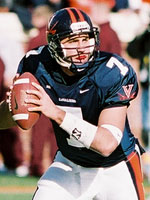 |
|
Schaub’s most memorable win, his final Scott Stadium performance over Virginia Tech. |
 Mike: What is the most memorable football win for you while at UVa and why?
Mike: What is the most memorable football win for you while at UVa and why?
SCHAUB: The last game I played at Scott Stadium against Virginia Tech. We hadn’t beaten them the first four years I was at the school, and to beat them on Senior Day in ’03 was something special and a great way to go out. And it’s the only time we’ve beaten Virginia Tech this decade.
 Mike: What’s the toughest loss you experienced while at UVa and why?
Mike: What’s the toughest loss you experienced while at UVa and why?
SCHAUB: Well, they’re all hard to take. It’s hard to pinpoint just one, but … gosh. I mean, the very first game I played as a starter against Wisconsin wasn’t very fun to be a part of because of how it transpired with all of the anticipation and build-up. That was a tough one. Also, the N.C. State game my senior year when me and Philip Rivers had a shoot-out going – they ended up winning with a couple of minutes left.
 Mike: Regarding the battle you had with Rivers that year, have you ever played in a game where both quarterbacks were both playing at such a high level?
Mike: Regarding the battle you had with Rivers that year, have you ever played in a game where both quarterbacks were both playing at such a high level?
SCHAUB: Not necessarily. I’ve had a couple of games [in the NFL] where it was like that for me, but they were against other teams that ran the ball pretty well and did some other things, so it wasn’t necessarily a huge shoot-out.
 Mike: When you were first at UVa you battled Bryson Spinner and eventually Marques Hagans for a starting spot. What was that process like? How did it help you in the long run?
Mike: When you were first at UVa you battled Bryson Spinner and eventually Marques Hagans for a starting spot. What was that process like? How did it help you in the long run?
SCHAUB: I think it makes you better and more attentive to the details of playing the position and knowing what goes into the preparation and the work ethic and how you go about your business. I think when you go through those things and you’re in competition, it helps you to have an edge about you, stay focused on your job and not relax. It helps you to stay sharp and stay on top of your game at all times, because any little slip and you might be pulled. At the same time, when you aren’t out there, you always have to be ready – stay sharp and be ready to go.
 Mike: Knowing that you could be pulled for another quarterback at any moment, how do you keep that from affecting your performance or getting you down if you get benched?
Mike: Knowing that you could be pulled for another quarterback at any moment, how do you keep that from affecting your performance or getting you down if you get benched?
SCHAUB: It’s a discipline thing. You have to force yourself not to think about those things and to keep yourself mentally sharp and focused and concentrate on job duties – to stop worrying about those other things and do what is necessary to get yourself ready to play the game.
 Mike: What clicked for you in the 2002 season between the Colorado State and South Carolina games that allowed you to progress and eventually become ACC POY?
Mike: What clicked for you in the 2002 season between the Colorado State and South Carolina games that allowed you to progress and eventually become ACC POY?
SCHAUB: It wasn’t anything that necessarily clicked, I just kept working and kept playing and I got another opportunity against Florida State in the second half and just never looked back. I was always prepared to play well; it was just a matter of going out and doing it. It wasn’t anything in particular, it was just that the stars kind of aligned for me.
 Mike: When did you know you could play QB for a living professionally? Did your last two seasons at UVa give you an indication or did you not realize it until a few games while at Atlanta?
Mike: When did you know you could play QB for a living professionally? Did your last two seasons at UVa give you an indication or did you not realize it until a few games while at Atlanta?
SCHAUB: I always had the confidence that I could do it. It was probably after my junior year at Virginia that I realized that, barring any injuries or unusual circumstances, that would be a possibility for me. I always had the confidence that I would be able to do it, it was just a matter of getting an opportunity once I did get to this level and then taking advantage of it. This league is all about getting opportunities and capitalizing on those opportunities.
 Mike: Talk about the impact Musgrave had on your development at UVa. How much did the different coaches at UVa impact your development, either positively or negatively? I believe you had three offensive coordinators, correct?
Mike: Talk about the impact Musgrave had on your development at UVa. How much did the different coaches at UVa impact your development, either positively or negatively? I believe you had three offensive coordinators, correct?
SCHAUB: Yes, [Gary Tranquill], [Bill] Musgrave and Ron Prince the last year. With Ron the offense never really changed – it was pretty much the same thing we did the two years prior. It was just somebody different calling the plays. Bill had a huge impact on my development. I’m the type of quarterback I am today, because at the time I was really developing into the quarterback that I wanted to be and needed to be. I heeded all of the advice from him I could considering that he was in the NFL so many years as a player and as a coach and all of the guys he’s been around.
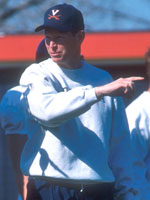 |
|
Schaub credits Bill Musgrave for having the greatest influence on him as a quarterback. |
 Mike: Considering you had three offensive coordinators while at UVa, what are the challenges of adjusting to a new OC at the collegiate level?
Mike: Considering you had three offensive coordinators while at UVa, what are the challenges of adjusting to a new OC at the collegiate level?
SCHAUB: Gary Tranquill was my first coordinator and I was a young player and not the starter at the time, so he wasn’t really mentoring me because he had larger fish to fry, so to speak, getting Dan [Ellis] and David Rivers ready to play – those were the two guys ahead of me.
With Ron [after Musgrave], he was already on the staff for two years as the offensive line coach, so it wasn’t like I was having to get to know a whole new person and have to learn his mannerisms and coach style. It was somebody we were already comfortable with so it was just full steam ahead.
 Mike: What is the key to successful quarterback development in the college game?
Mike: What is the key to successful quarterback development in the college game?
SCHAUB: I think one of the big things is the understanding that it’s not always going to be green pastures and sunny days. You’re going to have days where things don’t go your way as much as you want them to. Coming out of high school, most of the guys that were playing were the best guys on the field on Friday nights. When you get to those days on Saturday afternoon and things don’t quite go your way – you’re going to have those days and it’s not always going to be perfect. It’s how you handle the peaks and the valleys and deal with the adversity and try to remain on an even keel – just moving forward and always looking ahead and not dwelling on the past, good or bad. You have to be able to handle the two situations the same.
 Mike: UVa has long considered itself a true student-athlete program. Do you feel UVa’s commitment to academics helps or hinders the football program, and how?
Mike: UVa has long considered itself a true student-athlete program. Do you feel UVa’s commitment to academics helps or hinders the football program, and how?
SCHAUB: I think it definitely helps because you want the right type of people to be on board. You don’t want to have the state of your team or players in flux because of academics or whether they’re getting in trouble. You want to have the right type of people on and off the field. I think that’s what makes Virginia a special place – [the program] isn’t going to compromise its standards and the level of character it asks for in student-athletes just for an extra win or two.
 Mike: There has been much talk about academic support staff for football players. How would you describe the size and effectiveness of the academic support program at UVa, and what changes (if any) would you suggest for improving the program?
Mike: There has been much talk about academic support staff for football players. How would you describe the size and effectiveness of the academic support program at UVa, and what changes (if any) would you suggest for improving the program?
SCHAUB: It’s been so long since I’ve been there that I’m not sure of the state of the support system now, but when I was there I thought it was excellent. I thought that the right people were in place – they helped guys and provided the assistance that was needed. My thing is, as a player and student-athlete, a lot of the ownership is on the person. You can only help a person along so much – you have to take the initiative as a student-athlete to realize the position that you’re in and you have to take care of your business or else you’re not going to be in school. They’re very serious about that in college, especially at Virginia. The help is there if you need it. You’re not at home with your mom and dad anymore – you’re on your own and at some point you have to take initiative and go ask if you need assistance. You can’t have someone looking over your shoulder all the time wondering how you’re doing.
 Mike: That said, is there anything that could be done to monitor the situation more to help UVa players from falling behind – aside from someone else taking the tests for athletes, which UVa is obviously not going to allow?
Mike: That said, is there anything that could be done to monitor the situation more to help UVa players from falling behind – aside from someone else taking the tests for athletes, which UVa is obviously not going to allow?
SCHAUB: No.
 Mike: What’s your impression of Mike London as the new head coach at UVa?
Mike: What’s your impression of Mike London as the new head coach at UVa?
SCHAUB: I was there for three years [when he was there], so I got to know him pretty well. I definitely think he will be a good fit. Looking at his track record, he’s had a great coaching career. He’s a great motivator and a guy that can lead people and get them to play for him. He’s a great recruiter, so I think that will definitely help.
 Mike: You broke a lot of Shawn Moore’s passing records at UVa. Shawn along with a couple more assistant coaches has little or no college coaching experience. How important is it to have college coaching experience as an assistant coach at the position level?
Mike: You broke a lot of Shawn Moore’s passing records at UVa. Shawn along with a couple more assistant coaches has little or no college coaching experience. How important is it to have college coaching experience as an assistant coach at the position level?
SCHAUB: It’s hard for me to answer that as I’ve never been a coach and haven’t been on that side of the fence. But, I can say that on the college level it’s not so much needing experience to coach or jumping in to coach that position. I think it’s how you relate to the guys and how you teach – your skills as a teacher and a motivator and how you relate to them as people. I think that’s the most important thing when you’re a position coach at the college level – how you convey the information and how you relate to them in your meetings, and on the practice field, and how you get them to play. As a head coach you get some guys that don’t have any college coaching experience, so they have to start somewhere. If you believe in what a guy’s values are and what they stand for, it will work.
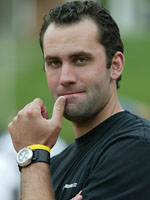 |
|
Matt Schaub, shown here in 2005, was named Pro Bowl MVP and has a baby girl due this March with wife Laurie. |
 Mike: You were married two years ago (to wife Laurie) and are now expecting a child in March. Talk a about the challenges of raising a family as an NFL QB and your excitement for having your first child.
Mike: You were married two years ago (to wife Laurie) and are now expecting a child in March. Talk a about the challenges of raising a family as an NFL QB and your excitement for having your first child.
SCHAUB: If you communicate and you have someone that understands your time commitment and what the season entails – and Laurie has been phenomenal the three years that we’ve been here. She understands football and what my responsibility is and my role with the team, and she’s 100 percent supportive and I couldn’t be happier. She understands what I go through on a weekly basis and she’s there to support me and understands my role. The big thing is communicating – the time commitment is an issue if you don’t talk about it.
I’m ecstatic about [having our first child]. Laurie and I will have been married for two years in February. It’s been the best and the greatest two years of my life. It’s been exciting to grow in our relationship and have a little girl on the way. We couldn’t be happier and we’re just looking forward to that day we bring her home. It’s going to be an exciting time. You know, taking care of a family is a special thing and something I’m really looking forward to when our little girl enters this world.
 Mike: A little earlier you spoke about keeping up with college teammates and working a business opportunity with Zac Yarbrough, your college center. Zac states that you’re not as good at golf as you might think and that you should have chosen him to help as your caddie for the Tahoe Celebrity Golf Tourney last summer.
Mike: A little earlier you spoke about keeping up with college teammates and working a business opportunity with Zac Yarbrough, your college center. Zac states that you’re not as good at golf as you might think and that you should have chosen him to help as your caddie for the Tahoe Celebrity Golf Tourney last summer.
SCHAUB: Well, I’m definitely a better golfer than Zac and I only play six months out of the year, and you can relay that back to him (laughs). If I were any better with golf, there would be some question of whether I’m spending enough time with football. Nah, it’s just a hobby and it’s fun to go out play – something to keep me busy and active in the offseason aside from my workouts. We have a great contingent of guys here in Houston that play so we have some fun matches much like I used to have with Zac, Ryan, Alex Field s and Billy Schweitzer at Birdwood in Charlottesville.
 Mike: Aside from dominating Zac on the golf course, what do you do when you’re not focusing on family and football? Do you have any hobbies and other activities in the offseason?
Mike: Aside from dominating Zac on the golf course, what do you do when you’re not focusing on family and football? Do you have any hobbies and other activities in the offseason?
SCHAUB: We like to get out and travel whenever we can in the offseason, but that’s probably going to come to a crashing halt here in a couple of months. Other than that we like to watch movies, but there’s not much time for anything else.
Matt Schaub’s UVa Records
Passing Attempts:
Career = 1,069 (2000-03)
Season = 418 (2002)
Game = 58 (2002 vs. Georgia Tech)
Passing Completions:
Career = 716 (2000-03)
Season = 288 (2002)
Game = 41 (2002 vs. Georgia Tech)
Passing Yards:
Career = 7,502 (2000-03)
Season = 2,976 (2002)
Game = 393 (2003 vs. N.C. State)
Completion Percentage (min 100 attempts):
Career = 67.0 (2000-03)
Season = 69.7 (2003)
Touchdown Passes:
Career = 56 (2000-03)
Season = 28 (2002)
Total Offense:
Season = 3,071 (2002)
Games Passing 200 Yards or More:
Career = 20 (2000-03)
Season = 9 (2003)
Consecutive Games with a Touchdown Pass: 14
Consecutive Games Throwing 200 yards or More: 6
Trivia Question for the Board
One of the few passing records that Matt Schaub doesn’t hold is number of touchdown passes in a game. Matt is tied for second place with three other UVa quarterbacks with five touchdowns. Which UVa QB threw for six touchdowns in a game, and against which opponent?

